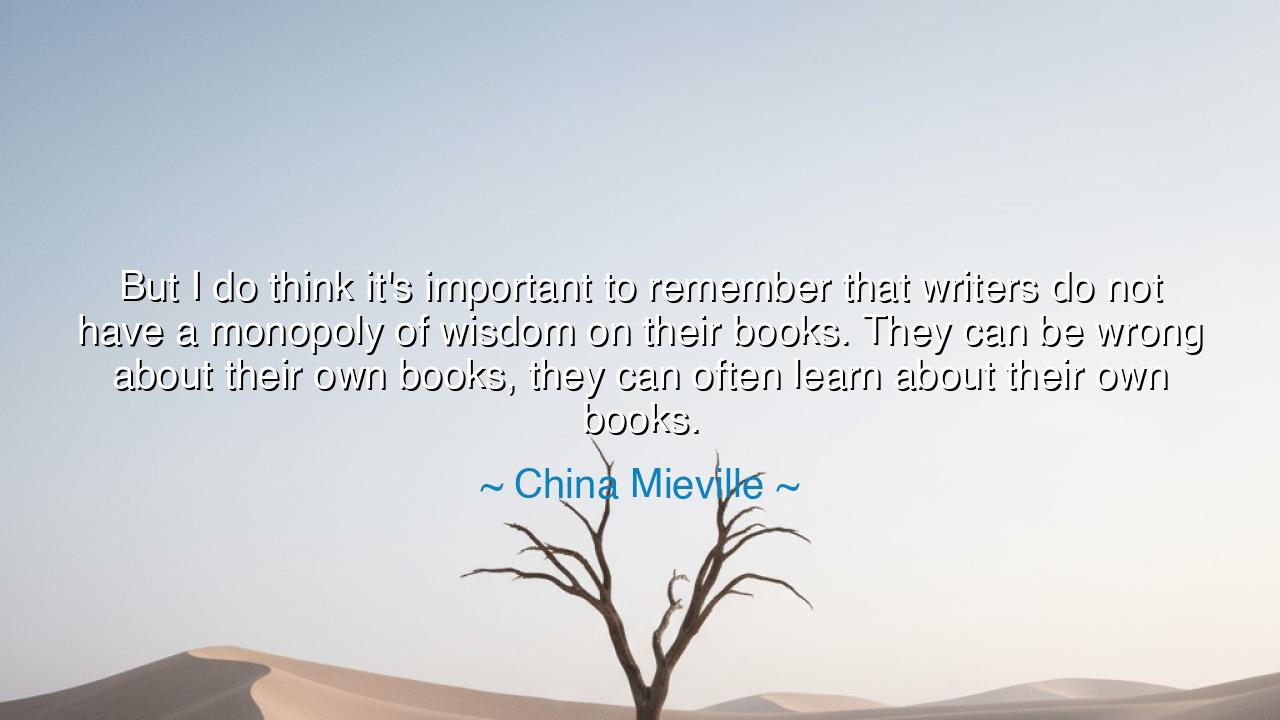
But I do think it's important to remember that writers do not
But I do think it's important to remember that writers do not have a monopoly of wisdom on their books. They can be wrong about their own books, they can often learn about their own books.






The words of China Miéville—“But I do think it's important to remember that writers do not have a monopoly of wisdom on their books. They can be wrong about their own books, they can often learn about their own books.”—speak with the humility of one who knows that art, once born, belongs no longer to its maker alone. A book is not a fixed stone but a living flame; it grows, changes, and reveals truths even its creator did not foresee. Thus Miéville reminds us that the writer is not a god enthroned above his work, but a fellow traveler who may yet learn from the echoes of his own creation.
This utterance reveals the mystery of interpretation. Words, once released into the world, take root in the minds of readers, who nurture them with their own experiences, insights, and struggles. A writer may intend one meaning, but the book may carry many. The creator can be blind to paths within the work, paths that readers, with fresh eyes, may illuminate. In this way, the act of writing is not only expression but dialogue—a conversation between soul and world, between author and audience.
History offers us the tale of Mary Shelley, who, in her youth, penned Frankenstein. To her, it was a story of ambition, loss, and the consequences of creation. Yet generations since have seen within it questions of science, identity, alienation, and even the ethics of technology—questions Shelley herself could not have fully foreseen. Thus her book taught not only her readers, but even her legacy, expanding beyond what its author alone had imagined.
The quote also calls us to embrace the humility of creation. Too often, artists and thinkers are tempted to cling to authority over their works, declaring their vision the only true one. But Miéville warns against this monopoly of wisdom. True greatness lies in recognizing that art is larger than the artist, that the voice of the reader and the times in which they live will always breathe new life into a text.
Let this wisdom endure for generations: do not bind a book to the narrow intent of its author, for its meaning is alive, shifting with the ages. Writers themselves must listen to their creations, as one might listen to a child who grows to teach the parent. As China Miéville teaches, the writer does not command the final word, but shares in an eternal discovery. In this lies the beauty of art: that it continues to teach, even its own maker, long after the ink has dried.






VKNguyen Van Khanh
This idea really resonates with me because it celebrates the dynamic relationship between writer and reader. Mieville implies that authors can learn from the interpretations their work inspires. That’s a beautiful thought — that creativity doesn’t end with publication but continues through dialogue and reinterpretation. Do you think all writers welcome that kind of reinterpretation, or do some resist it because it challenges their sense of ownership?
MNhuynh man nhu
I find this quote humbling and insightful. It acknowledges that creativity doesn’t always come from conscious control — sometimes artists discover meaning only through the eyes of others. It makes me think of how literature classes dissect works for symbolism that authors might never have planned. Does that diminish the author’s role, or does it expand it by showing how art transcends its creator’s awareness?
BNBao Nhu
This statement feels almost radical in a world where authorial intent is often treated as sacred. Mieville seems to believe that books have lives independent of their creators. That idea is freeing — and a little unsettling. Can a story truly ‘belong’ to the public once it’s published? I’d love to know how he reacts when readers interpret his work in ways completely opposite to what he meant.
Ddung
Mieville’s observation is refreshing — it suggests humility in creativity. Authors aren’t gods of their own texts; they’re participants in an ongoing dialogue. It makes me wonder if meaning in art is ever fixed. Could it be that books evolve as culture and readers change? Maybe writers are only the first interpreters of their work, and every reader afterward adds another layer of understanding.
DHNgo Duc Huy
I really like this quote because it humanizes writers. It reminds us that even the people who create stories can misread or underestimate what they’ve made. Sometimes, readers uncover themes and meanings the author didn’t consciously intend. That’s what makes literature so alive. Do you think great art always contains more than its creator realized, or does interpretation just reveal more about the reader than the work itself?